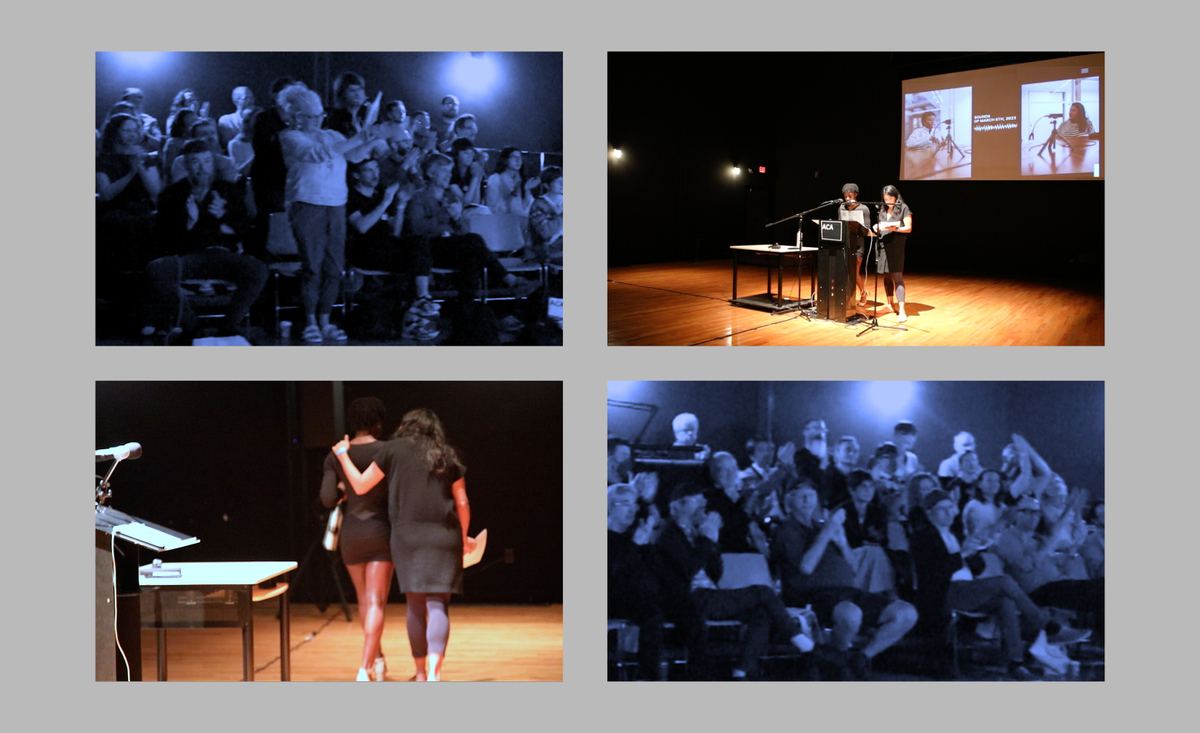A Shared Keynote
A collaborative intergenerational inaugural speech at the World Forum for Acoustic Ecology.
From March 23 to 26, 2023, 17-year-old Bénéwendé Ségueda, soundwalk artist Amanda Gutierrez, and myself traveled to Florida, USA, to participate in the World Forum for Acoustic Ecology at the Atlantic Center for the Arts. Over the course of the two months leading up to the Forum, Amanda and I brought together our respective artistic practices to design and facilitate a series of five after-school workshops at the Center for the Study of Learning and Performance at Concordia University with our teenage counterpart, Bénéwendé. During these workshops, Bénéwendé was introduced to the history and practice of acoustic ecology as well as to what Amanda and I conjointly perceive to be at stake when engaging in the act of listening from an intersectional positioning.
An important goal of these individualized workshops was the co-authored writing of the inaugural "Shared Keynote" speech that was delivered on stage by Bénéwendé and Amanda. After engaging with different types of sound recording technologies and creating soundscapes of her own environment, such as her high school and neighborhood, Bénéwendé conducted interviews where she not only spoke of her experience in relation to those of older women from different intersecting backgrounds but also explored questions such as: What does it mean to listen through my ear, which is attached to my body, my gender, my skin, my age? How does my acoustic experience fit into what acoustic ecology traditionally offers?
The culminating highlight of this intergenerational collaboration was Bénéwendé's travel to the Forum in Florida with myself and Amanda. Our "Shared Keynote" speech was the conference's inaugural keynote address, which took place in front of an international congregation of over 250 scientists, artists, and activists. Bénéwendé, a 17-year-old Ivorian-Burkinabé-Québécoise high schooler from the Saint-Léonard borough, captivated the audience with her contribution, which included her talking about her life, her family, her concerns, and the ideas she wants to share with the world. Bénéwendé also decided to talk about the challenge of equality for women in the global south.
Following the "Shared Keynote", the three of us held a group conversation with conference attendees who attended the speech to gain insight into the experiences and perspectives of those in the audience. The following questions were explored:
- Could this type of inclusive, participatory, and embodied discursive practice be implemented within your own institution (education, artistic, scientific)?
- Now that you have experienced, as an audience member, this sharing of discursive authority, could you, as artists, researchers, and decision-makers, see yourselves directly facilitating the inclusion of the community stakeholders with whom you work? This would involve replicating the same approach that was piloted here by the three of us. By doing so, you would enable the community stakeholders to represent and speak for themselves about the work that you do together.
The audio and video documentation of both the "Shared Keynote" and the subsequent conversation are being articulated into an iterative media artwork that will be presented in various artistic and academic spaces as a tool for the discussion and implementation of more responsive, inclusive, participatory, and representative dialogic practice within these very institutions.
I would like to thank Les Offices jeunesse internationaux du Québec for their financial support. This investigation and work would not have been made possible without the support of the UNESCO Chair in Prevention of Radicalization and Violent Extremism, co-chaired by Dr. Vivek Venkatesh via Project Someone.
